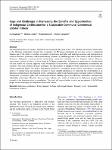Thông tin tài liệu
Thông tin siêu dữ liệu biểu ghi
| Trường DC | Giá trị | Ngôn ngữ |
|---|---|---|
| dc.contributor.author | Elegbede, Isa | - |
| dc.contributor.author | Zurba, Melanie | - |
| dc.contributor.author | Hameed, Ahmad | - |
| dc.date.accessioned | 2023-10-04T03:42:29Z | - |
| dc.date.available | 2023-10-04T03:42:29Z | - |
| dc.date.issued | 2023 | - |
| dc.identifier.uri | https://link.springer.com/article/10.1007/s00267-023-01852-7 | - |
| dc.identifier.uri | https://dlib.phenikaa-uni.edu.vn/handle/PNK/9445 | - |
| dc.description | CC-BY | vi |
| dc.description.abstract | The Marshall Decision of Canada’s Supreme Court inspired the Mi’kmaq in the 1700s regarding recognizing fishing rights to the Mi’kmaq communities. Despite this recognition, the Mi’kmaq communities did not have access to commercial fisheries due to the denial of absolute recognition of territories and rights and underrepresentation and participation in resource allocation, governance, and decision-making processes. A potential approach to these issues is the development of third-party Indigenous community-based sustainability certification standards for the American lobster (Homarus americanus) commercial fishery of Nova Scotia by Mi’kmaq communities. An Indigenous certification is a market-based tool that focuses on a holistic approach to the sustainability of the resource, followed by independent accreditations and standards. | vi |
| dc.language.iso | en | vi |
| dc.publisher | Springer | vi |
| dc.subject | Mi’kmaq communities | vi |
| dc.subject | Opportunities of Indigenous Certification | vi |
| dc.title | Gaps and Challenges in Harnessing the Benefits and Opportunities of Indigenous Certification for a Sustainable Communal Commercial Lobster Fishery | vi |
| dc.type | Book | vi |
| Bộ sưu tập | ||
| OER - Khoa học môi trường | ||
Danh sách tệp tin đính kèm:

